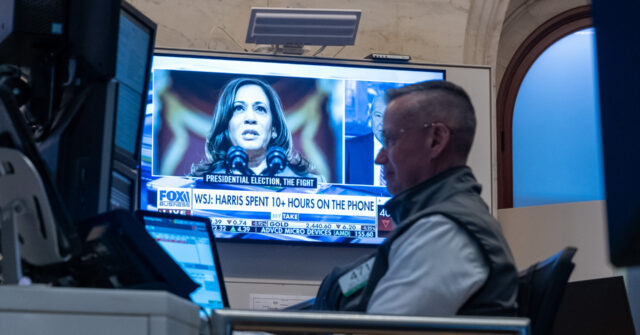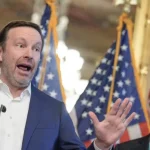
The Japanese stock market suffered its worst single-day sell-off in history Monday, losing even more points than on “Black Monday” in 1987.
The post Kamala Crash: Japanese Stocks Lose More Points than on ‘Black Monday’ in 1987 appeared first on Breitbart.

Spooked in part by a looming recession under the policies of Joe Biden and Kamala Harris in the United States, the Japanese stock market panicked on Monday and suffered its worst single-day sell-off in history, losing even more points than it did on “Black Monday” in October 1987.
The higher volume of the Nikkei Stock Average meant the dizzying loss of 4,451.28 points was its second-largest fall by percentage, coming in at 12.4 percent to the 14.9 percent drop when the average lost 3,836.48 points on Black Monday.
There were some local factors in Monday’s plunge, such as the Bank of Japan raising interest rates from 0.1 percent to 0.25 percent last week, but market analysts told Nikkei Asia the primary cause of the crisis was mounting fear of an outright U.S. recession in the closing days of Joe Biden’s troubled presidency:
Foreign investors are selling Japanese stocks due to concerns that the U.S. may be heading for a recession, said Naka Matsuzawa, chief strategist at Nomura Securities. “The fall is not really happening due to Japan-specific reasons,” he said. “Markets are still trying to find the bottom.”
He said he is taking a “wait-and-see approach until U.S. tech stocks show some kind of resilience.” He does not foresee a global recession, and said markets will be volatile until the U.S. Federal Reserve lowers rates. Investors are pricing in a cut by September.
The Nikkei plunge was so dizzying that “circuit breakers” were triggered several times on Monday, temporarily locking down trades until the market stabilized.
All of Japan’s big banks lost double digits of value, in some cases roughly 20 percent, which in turn crushed the stock value of big export companies, such as Japan’s automotive giants.
“It was the first chance for traders in Tokyo to react to Friday’s report showing U.S. employers slowed their hiring last month by much more than economists expected,” the Associated Press (AP) said of Japan’s market slump on Monday.
“That was the latest piece of data on the U.S. economy to come in weaker than expected, and it’s all raised fear the Federal Reserve has pressed the brakes on the U.S. economy by too much for too long through high interest rates in hopes of stifling inflation,” the AP said.
The Taiwanese and South Korean stock markets dropped as well, losing 8.4 percent and 8.8 percent respectively. It was the largest single-day drop in the history of the Taiwanese benchmark exchange.
The Financial Times (FT) said international investors are worried that “the Federal Reserve has been too slow to respond to signs the US economy was weakening, and might be forced to play catch-up with a series of rapid interest rate cuts.”
JP Morgan portfolio manager Priya Misra predicted the U.S. would avoid a full-blown recession, but “the markets will continue to panic until the Fed shows signs of moving.” Some of the more optimistic analysts felt Japan’s market dive could be a healthy market correction after years of heavy borrowing at low interest rates to finance currency trades and tech development.
American markets plunged on Monday as well, with the S&P 500 losing 3.1 percent and the Dow Jones Industrial Average (DJIA) falling 3.6 percent. The AP quoted some analysts who hoped this, too, might be a helpful market correction after a year of artificial highs driven by “a frenzy around artificial-intelligence technology and hopes for coming cuts to interest rates.”
The AP added:
Still, stocks of companies whose profits are most closely tied to the economy’s strength took heavy losses on the fears about a slowdown. The small companies in the Russell 2000 index dropped 4.3%, further dousing what had been a revival for it and other beaten-down areas of the market.
“Markets are a little bit out of control. This is just total panic. It’s not real but it is painful and it could be with us for a few weeks,” Andrew Brenner of National Alliance Securities told the New York Times on Monday.
“The market response is a reflection of the deteriorating U.S. economic outlook. It was a New York sneeze that forced Japanese pneumonia,” Jesper Koll of the Monex Group said.
Some economists held out hope that the weak July jobs report published on Friday – the event that most agree triggered Monday’s worldwide market panic – could have been “an aberration because of Hurricane Beryl,” as the BBC put it. Hurricane Beryl inflicted significant damage when it made landfall in Texas on July 8 after ravaging the Caribbean and parts of Mexico.
“You can pick out evidence to create a positive story, you can also pick out the evidence to create a negative story. I don’t think it universally points to one direction yet,” M&G Wealth chief investment officer Shanti Kelemen told the BBC.




